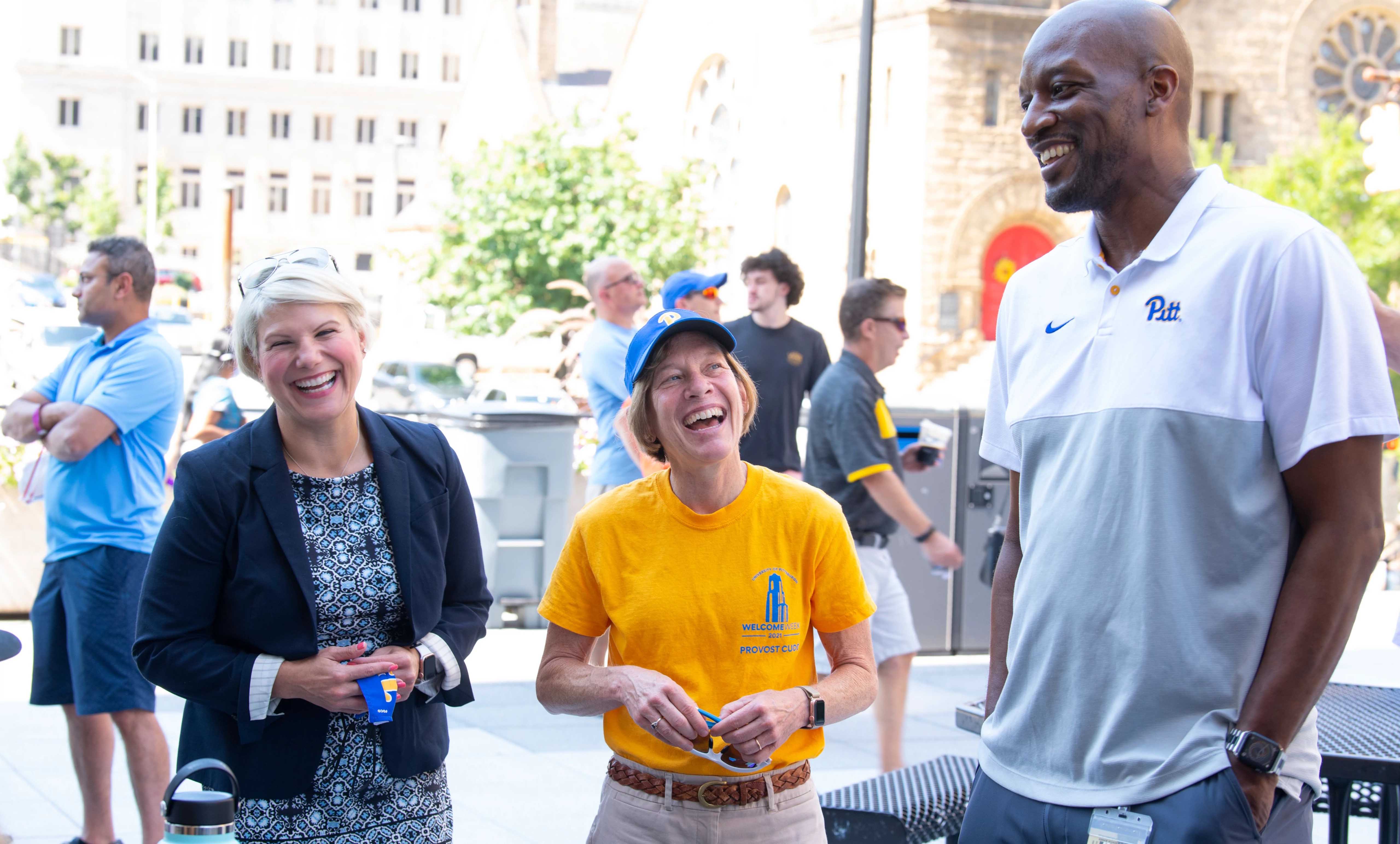
By SUSAN JONES
The fall 2021 semester isn’t starting out exactly like she hoped, but Provost Ann Cudd is still excited to see students and families back on campus.
“Welcome Week is such an exciting experience that I have renewed enthusiasm for it,” she said after greeting students during the week along with Kenyon Bonner, vice provost for student affairs, and new Dean of Students Carla Panzella. “I’m really excited about the huge first-year class we have, and what that says about confidence in Pitt as an institution.”
As of Aug. 24, the number of registered first-year students was around 4,940, well over the target of 4,255. “It’s a challenge because we have to have more sections. We have to have more classrooms, we have to have more dormitories,” Cudd said. “But all the deans of who have these first-year students seem to be rising to the occasion and I haven’t heard complaints.”
She noted that the number of Pell-eligible students, who receive matching grants through the Pitt Success program, continues to rise, but overall net tuition revenue is up.
All students and faculty are facing some uncertainty going into the semester after Cudd’s announcement last week that they could choose to teach and learn remotely or in-person until Sept. 13.
“The point of my message was we need to be able to reassure everybody on campus that in fact we have a very high vaccination rate,” she said.
Pitt has seen a 10 percent increase in the past week of the number of people who have uploaded proof of vaccination, according to the COVID-19 Medical Response Office. In total 66 percent of faculty, 69 percent of staff, 74 percent of undergraduates and 48 percent of graduate students have disclosed their vaccination status.
The provost’s office has gotten a couple dozen emails from parents and students about the remote option. “Some parents said they did not like even the idea that there might be a pause in the full in person in the classroom, and I understand that. The students want a fully vibrant classroom experience and they’re eager for that,” Cudd said. “We also heard from people who said this was reasonable and I’m glad there’s a little flexibility for the people who are very worried. And this may be a good way to start back.”
She was disappointed that only about half of faculty and staff had uploaded proof of vaccination by last week, particularly because Faculty Assembly earlier this year advocated for a vaccine mandate. But she thinks the low numbers were mostly from people putting it off over the summer and now that there’s a sense of urgency, she’s seeing the numbers of people sending in their disclosures rising daily.
“We’re in a much better place than we were a year ago,” Cudd said. The vaccination rates on campus and in Allegheny County are rising every day.
When the information came out this summer that the Delta variant was much more infectious and that fully vaccinated people could transmit it, that was very alarming to people, she said. “What we know is that universal masking is really very effective, even against the Delta variant,” she said. Pitt has maintained its indoor masking policy throughout the pandemic.
New budgeting model
The provost also talked about the new responsibility center budget model being developed by a committee she co-chairs with Chief Financial Officer Hari Sastry. She was headed to a meeting just after her interview with the University Times to discuss governance structures to support the new budget model, “which is really, really important,” she said.
A retreat is scheduled with all the deans next week to go over the parameters of the budget that have been developed, such as the participation fee and cost allocation. The budget figures from fiscal year 2019-20 have been run through a model using the new parameters, “and it looks good; it looks like it’s going to work,” she said.
“The retreat is designed to iron out any last concerns. And I believe we will have the consensus of the deans by the end of this. But they’ve done a great job of both advocating for their schools but also thinking about the big picture.”
The new model passes much more of the revenue, both from tuition and research directly to the schools, Cudd said, so they can be more entrepreneurial and innovative to create new programs and to decide more quickly and nimbly how to allocate faculty and staff to optimize their operations. The central administration will act more as this driver for the Plan for Pitt and the overarching strategic goals of the University.
This model does create a bit of a competition for students. Cudd said part of the governing structure will be a new charge to the curriculum committees — the Provost’s Advisory Committee on Undergraduate Programs and the University Council on Graduate Study— to monitor that one school doesn’t encroach on another’s territory, such as the engineering school offering its own English class.
The University Planning and Budgeting Committee will still be involved in the process and, Cudd said, “one of the points that I think the Senate Budget Policy Committee has made very effectively, and that we are definitely emphasizing with the deans, is that the unit level planning and budgeting committees, if a lot more decision making is going on at the units, then they need to be very involved in that.”
Susan Jones is editor of the University Times. Reach her at suejones@pitt.edu or 724-244-4042.
Have a story idea or news to share? Share it with the University Times.
